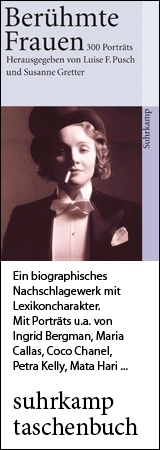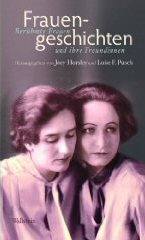Biographies Senta Trömel-Plötz

born on February 26, 1939 in Munich, Germany
German linguist, author and feminist
85th birthday on February 26, 2024
Biography
A love of language has shaped the life and work of Senta Trömel-Plötz, a linguist and the author of literary collages on women’s lives that she called “Wortstücke” (word compositions).
How horrible for a woman who loves language to come to the realization that this beloved language reflects the male dominance of a society in which woman is absent, often left unmentioned and certainly never honored! Since the late 1970s, Trömel-Plötz has criticized a male-dominated language that behaves, right down to its grammatical structures, as though women don't exist. She specialized in the analysis of conversations, in particular of dominant speech acts in which power is exercised. As if to illustrate the findings of her research, Trömel-Plötz was unable to obtain tenure at any German university, despite her habilitation and an enthusiastic response to her books. It was certainly no coincidence that her applications for professorships were repeatedly rejected.
Together with Luise F. Pusch, Trömel-Plötz founded feminist linguistics. The two linguists contributed definitively to making feminism a matter of public concern in German-speaking countries. They shook the German Society for Linguistics out of its lethargy, for which they received little thanks from their academic colleagues. They succeeded, however, in becoming politically effective and in establishing a fairer language.
It began in 1978 with the article “Linguistik und Frauensprache” (Linguistics and Women's Language) – the reactions to it made the author even more aware of the socially explosive nature of the topic – and the development has continued to this day. Trömel-Plötz not only uncovered the misogynistic use of language; she also identified the special conversational skills of women. The message of the book Frauengespräche: Sprache der Verständigung (Women's Language: Language of Understanding/Communication) has not yet been fully put into practice. Men too can learn the feminine ability to attain solidarity and understanding through conversation. No women's paradise is meant by this, as some critics have suspected; it is simply wise to to have such additional conversational skills at one’s disposal.
Senta Plötz's childhood and youth were marked by the war and post-war period. Perhaps it was from these early experiences of survival that she learned to love life so passionately. As a girl, loved and encouraged by her parents, she experienced the Nazi era, nights of bombing and worries about food. At an early age, she made the acquaintance of authors such as Jella Lepman and Erich Kästner in the International Youth Library, viewed her female teachers at grammar school as role models and, in particular, became acquainted with American English. She associated the language with liberation, her first sweets, and the promotion of American culture in the Amerika-Haus in Munich.
Later, her language became more poetic, and she concentrated on women's lives. The theme is already foreshadowed in Vatersprache - Mutterland (1992) with her first word composition Der Tod der Frau im Mann (The Death of the Woman in the Man) and with an article on the life and significance of the brilliant physicist Mileva Einstein-Marić. Trömel-Plötz asked why the physicist’s relationship with Albert Einstein was so devastating, destroying all the ambitions and dreams that had brought Mileva to Zurich with such promise. How could she do justice linguistically to this woman's life, a life for which there is no room in the male language? How could she express happiness and suffering, failure and death, but also success? In these word compositions – others about the painters Sophie Taeuber-Arp and Paula Modersohn-Becker followed – Trömel-Plötz interweaves the lives of highly talented women. Where their own words fail, poets come to the rescue. The words of the one comment on the life of the other. She brings these words into a dialog so that the word compositions about the various women as a whole, and indeed precisely through the individuality of each one, become a kind of universal biography of women. The tragedy of women who founder in a society that tailors to men and where convention makes no allowance for female abilities and talents is a cultural and not a natural catastrophe. And yet these word compositions caringly reveal what the female artists and scientists have achieved despite the patriarchal sabotage.
In more autobiographical word compositions, we read once again about her parents' love, her love of language, of nature, of America, of women, of friends female and male, and not least of her love for her three sons, for whom she officially became solely responsible in 1986. The fact that, unlike many women of earlier generations, she survived the dichotomy between children and scholarly and artistic talent is to a great extent due to her own feminist work.
Senta Trömel-Plötz now lives in Pennsylvania, USA; she regularly gives readings and lectures in Europe.
(Text from 2008; translated with DeepL.com; edited by Ramona Fararo, 2024.)
Please consult the German version for additional information (pictures, sources, videos, bibliography).
Author: Bettina Schmitz
Quotes
The best woman is the one who doesn't speak. Do we talk differently from men? Do we talk differently to women from to men? How do men talk about us? How are we talked about? What does MAN say about how we talk? (Frauensprache, p. 27)
The differences in the way women and men speak come about because women and men are not treated equally in conversation. [...] There are historical and political reasons why women and men are judged differently when they speak. For example, until recently, women were not allowed to speak publicly about certain topics. (Gewalt durch Sprache, p. 289f.)
As if that wasn't enough, they are calling for Luise Pusch to be stripped of her habilitation and for me to resign. What we write is a major annoyance to them [...] My resignation has long since been seen to by such men, nameless men, utterly insignificant men, who have no name except through their bottomless criticism of us. These are men of whom no one has ever heard, who have never been invited beyond their field, never lectured abroad, never given a radio interview, never been invited to a parliament, utterly unknown academic nobodies who have not published a single book that was read by more than a handful of men as insignificant as themselves. (Vatersprache – Mutterland, p. 27f.)
My interest as a feminist and linguist is to make positive female characteristics visible and to contribute to their positive evaluation. The aim is not to relegate women to responsibility for the social sphere, for relationships and families, but on the contrary to broaden our human integrative qualities by making them visible outside the private sphere and showing their positive effects in public and in professional life, to give them recognition outside private life, so that both women and men can practice them in public and private and our society changes. (Frauengespräche, p. 18f.)
What began so promisingly as an equal relationship on an equal level, when they both studied at the ETH and shared hopes and ideas, ended in shadow work as coworker and muse, ended in unpaid work as housewife, cleaner, nanny, educator and nurse. What began so promisingly as a love affair ended in bitterness and loneliness. Destruction of female creativity/self-sacrifice out of love/the sacrifices unappreciated/the traces almost extinguished. (Mileva Einstein-Marić: Eine Annäherung, p. 78)
If you hold the rights to one or more of the images on this page and object to its/their appearance here, please contact Fembio.



